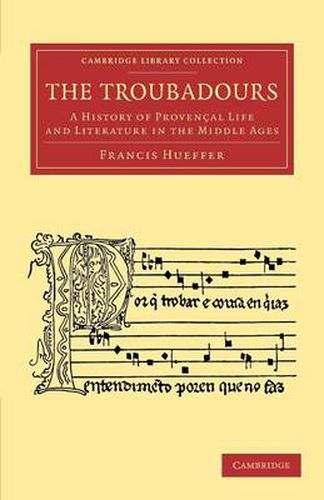Readings Newsletter
Become a Readings Member to make your shopping experience even easier.
Sign in or sign up for free!
You’re not far away from qualifying for FREE standard shipping within Australia
You’ve qualified for FREE standard shipping within Australia
The cart is loading…






Born in Germany, where he studied music and philology, Francis Hueffer (1845-89) moved to London in 1869 to pursue a career as a critic and writer on music. He edited a series of biographies of notable musicians, served as music critic for The Times, contributed articles to Grove’s Dictionary of Music and Musicians, and was an early advocate and interpreter to the British of Wagner. In 1872 he married Catherine, the younger daughter of the painter Ford Madox Brown. Their son was the writer Ford Maddox Ford. Provencal studies were an abiding interest of Hueffer’s and he intended this work, first published in 1878, to be an approachable English-language study of medieval Provencal literary and musical culture. It won him membership of the Felibrige, the association of Provencal writers, and he gave lectures on the topic at the Royal Institution in 1880.
$9.00 standard shipping within Australia
FREE standard shipping within Australia for orders over $100.00
Express & International shipping calculated at checkout
Born in Germany, where he studied music and philology, Francis Hueffer (1845-89) moved to London in 1869 to pursue a career as a critic and writer on music. He edited a series of biographies of notable musicians, served as music critic for The Times, contributed articles to Grove’s Dictionary of Music and Musicians, and was an early advocate and interpreter to the British of Wagner. In 1872 he married Catherine, the younger daughter of the painter Ford Madox Brown. Their son was the writer Ford Maddox Ford. Provencal studies were an abiding interest of Hueffer’s and he intended this work, first published in 1878, to be an approachable English-language study of medieval Provencal literary and musical culture. It won him membership of the Felibrige, the association of Provencal writers, and he gave lectures on the topic at the Royal Institution in 1880.